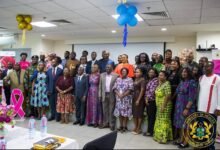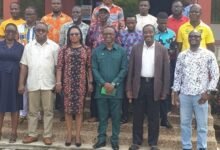WFP presents 60 donkeys, wheel carts to women farmers in UER
The World Food Programme (WFP) has handed over 60 donkeys and 24 wheel carts with other accessories to women farmers in five districts in the Upper East Region.
Apart from helping to reduce the drudgery the women farmers in the area often go through in transporting agriculture produce from the farm to the home and to the market, it was also aimed at reducing post-harvest losses.
In Ghana, post-harvest losses of food produce accounts for more than 30 per cent; the situation is more serious with women farmers who have to carry their farm produce on their head over long distance to either their homes or the market.
The 20 women lead farmers from 10 farmer-based organisations in 10 communities from the five districts including the Bawku Municipal, Tempane, Bawku West, Binduri and Bongo districts who received the facilities, are to ensure that all women farmers in the beneficiary districts benefited enormously.
The labour-saving transportation initiative dubbed ‘Donkey-Cart Transportation Project’, is being implemented in collaboration with the Savannah Agriculture Research Institute (SARI), Manga Station, and the Upper East Regional Directorate of the Ministry of Food and Agriculture (MoFA).
The pilot project, with funding from the Government of Canada, is set to benefit more than 1,500 farmers in the region and forms part of the WFP’s Enhanced Nutrition and Value Chains (ENVAC) initiative and the Sustainable Food Systems component of the WFP Ghana’s 2019-2023 country’s strategic plan.
Speaking during the inauguration of the project at Manga in the Binduri District on Friday, Ms Rukia Yacoub, the Representative and Country Director of WFP, said the move was to enable farmers, particularly women who were the most vulnerable in access to transportation, carry their farm produce from the farms to their homes, storage facilities and markets.
She said the effort is geared towards reducing the incidence of carrying loads on their heads, post-harvest losses, as well as boost the quality and quantity of food produced to achieve the Sustainable Development Goals.
“Research shows that globally, in developing countries, 40 per cent of food losses amounting to $310 billion, occur at the post-harvest and processing stages, while in industrialised countries, more than 40 per cent of food waste, roughly $680 billion, happen at the retail and consumer levels.
“Despite constituting over 50 per cent of the agricultural labour force, women in Ghana still lack access to basic farm inputs and machinery, land, credit, and market opportunities that will enable them to increase their productivity and income,” Ms Yacoub said.
The Project Coordinator of SARI, Manga Station, Dr Francis Kusi, stated that as part of the project, capacities of farmer groups had been built in the areas of record keeping, welfare for working donkeys, breeding donkeys, business development and post-harvest management among others.
The Upper East Regional Minister, Ms Paulina Patience Abayage, expressed gratitude to WFP, SARI and the Canadian government for their support over the years and said it would effectively boost the implementation of government’s flagship programme, Planting for Food and Jobs and the Ghana Beyond Aid agenda.
She gave the assurance that the Regional Coordinating Council (RCC) would work closely with SARI and the Department of Agriculture in the region to replicate the technology in other districts.
FROM SAMUEL AKAPULE, MANGA






